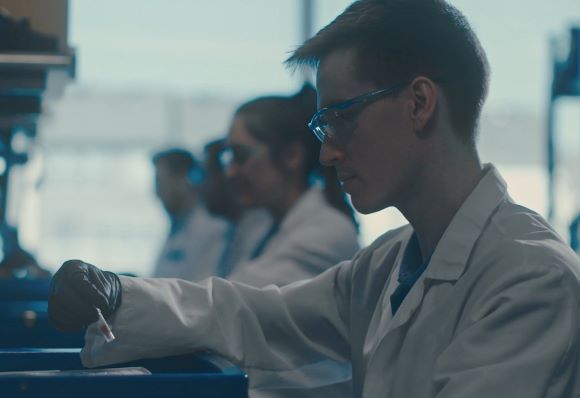SMALL BUT CRITICAL: ONE CLINICAL TRIAL SAMPLE’S JOURNEY
Clinical trials are essential in bringing new treatments to market, but successful outcomes require global logistics to be carefully considered and rigorously planned.
While the use of technology has made managing logistics in global trials more efficient, a break at any point in the process could compromise the trial outcome. From sample collection, to shipping and storage, the vital research assets of every trial must be securely managed.
To illustrate the essential role of logistics in the success of the clinical trial, we’re taking you on a journey, following one sample: a sputum sample from a global Phase III trial testing a treatment for the cancer with the highest mortality rate worldwide, lung cancer.
The first stage: trial design
Before a sample can be collected, a significant amount of work goes into designing the trial.
The trial protocol is developed and informs the planning of trial logistics. Global partners must be found who are capable of defining and manufacturing kits customized to trial needs and the schedule of assessment, who can distribute to sites (directly if needed), who can identify and source the necessary trial equipment, and who can provide trial sample archiving and biorepository requirements. Using a single partner for all these multiple elements of a clinical trial - from planning through to execution and completion - can streamline the entire process and reduce complexity, cost and risk.
Critical considerations are made as to multi-regional and national regulatory requirements in preparing any clinical sites for the site initiation visit (SIV), while trial participants are found from over twenty countries across Europe, North America, and Asia, and trial-specific sample collection kits are ordered.
In the case of our soon-to-be-collected sample, customized sputum sample collection kits are designed, carefully assembled, and securely stored by the kitting provider, ready to ship as required. Our trial is using a direct-to-patient model which makes the process easier for trial participants and can reduce or even eliminate the need for global collection sites.
Increasingly, these at-home sample collection methods are being used in clinical trials, making customized kit design and specified shipping processes essential. Partners may use consolidated multi-site distribution plans to optimize freight or manage the shipping of sample collection kits directly to and from participants.
The second stage: the trial begins
Around the world, trial participants have started their treatment.
Our participant receives their collection kit and follows the guidelines to collect and submit their sample. With each sample collection unit uniquely barcoded prior to distribution, our participant’s sample is easily linked to its order number and sample consolidation site, reducing complexity and preventing any misidentification. At this point, the sample is securely preserved in cold storage for the next stage of its journey.
The third stage: results are analyzed
Our sample is shipped to a central lab or speciality lab for analysis and the results are entered into the trial’s specialized database. It is one of thousands of samples collected from over twenty countries. The results form part of the data set used to build a clear picture of the Investigational Medical Product’s (IMP) effectiveness in the treatment of the disease.
Any shipment of materials between locations carries risk, and trial managers take care to minimize such movement. Working with a single solution partner with the logistical processes, systems, and expertise to secure the transportation of critical research samples also ensures a robust chain of custody ensuring quality, standardisation of processes from site to site and reproducibility.
As the trial team doesn’t need to worry about the complexities of sample collection, safety, and tracking, they are able to focus on overall trial outcomes and patient experiences. This improves patient retention and lessens the likelihood of a patient’s early withdrawal from the trial, reducing the risk of negative commercial impact.
These are all important stages towards a successful trial outcome. Meanwhile, our sample has one more stage to go…
The fourth stage: results are secured
After being shipped to a biorepository and archiving facility, our sample is stored along with the other trial samples.
The safety, security, and rapid retrieval of these samples is critical—they may be needed for future analysis or requested by regulatory bodies up to 20 years after trial conclusion, so robust measures are taken to secure their preservation and rigorous standard operating procedures are applied to indexing and storage.
At the archiving and biorepository facility, they are kept in temperature-controlled environments - in this case, in freezers at -80 degrees C - with layers of back-ups, redundancies, security and constant monitoring/audit trail. Their unique barcodes and precise storage location enable easy identification and speed of retrieval and return should they be required again.
As the trial concludes, the partner provides regulatory sunshine reports, collects and tracks trial equipment from the sites to meet end-of-study requirements, and any remaining participant and physician materials are sent for storage in the biorepository and archive facility. These are subject to the same rigorous systems as the samples to ensure they too are ready for any future use or regulatory body review.
Our sputum sample may only be one small piece of a global effort to find a better treatment for a life-threatening disease, but it’s an essential piece—and every stage of its journey is critical.
From the individual participant who gave the trial sample, to the thousands who may one day receive the treatment from their healthcare provider, many lives depend on the efficient execution of the complex and varied logistical processes that support the trial through to successful completion.
Every stage of a clinical trial involves difficult challenges, but by entrusting the logistics to a single expert partner, professionals running clinical trials can be confident in ensuring the safety and security of their critical research samples.
